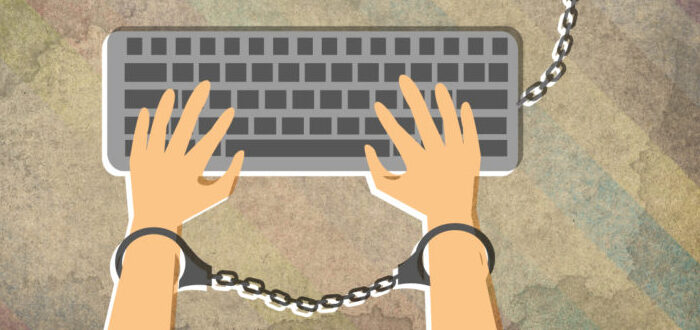In response to increasing citizen protest and activism online, especially during and after the 2011 pro-democracy movement in Bahrain, the Government of Bahrain intensified its efforts to silence peaceful criticism and intimidate activists online. Along with its overly broad and vague anti-terror law, Bahrain cracks down on dissent online through cybercrime legislation, including the Information Technology Crimes Law of 2014, which allows for the prosecution of free speech online. While Bahrain’s cybercrime laws largely deal with issues like personal data protection, IT crimes, electronic transactions, and online records, the government applies State security, media regulation, and anti-terror laws to target criticism online.
The Telecommunications Regulatory Authority extensively monitors and censors content on the Internet and requires all internet service providers to use its filtering system. It has also initiated internet shutdowns in response to demonstrations organized on social media and blocked websites at will. The technological tools of the government allow it to track all online activity and quickly identify critics, remove their posts, and pursue punitive measures against them.
The Ministry of Interior, for example, announced in 2019 that anyone found following or interacting with social media accounts that “incite sedition and threaten civil peace” can face legal sanctions. The Ministry warned users not to share “extremist” or false content that “offend Bahrain and its people.” These poorly-defined terms have been used against peaceful activists calling for greater rights online. According to Bahrain’s anti-terror law, any online speech found to “prejudice national unity” can constitute a terrorist offense and be punished accordingly. The Bahraini Penal Code also forbids any false statements that threaten security or the public interest. Similarly, the Media Regulation Law of 2002 and the Cybercrime Directorate penalize fake news, speech critical of public figures, and criticism of friendly foreign countries.
Because of the vague provisions of these laws and the government’s relentless crackdown on free speech, numerous activists have been arrested and jailed due to their social media posts. In 2012, four men were arrested for defaming the King online and sentenced to several months in prison under a law that forbids any criticism of the King.
Meanwhile, prominent human rights defender Nabeel Rajab was sentenced to a total of seven years in prison due to posts on Twitter about religious extremism in the Ministry of Interior, torture in Jau Prison, and the killing of civilians by the Saudi-led coalition in Yemen. Authorities labeled his tweets as “fake news” and “offending a foreign country,” thus resulting in punishments under the Media Regulation Law. Although Rajab was released in 2020 under Bahrain’s alternative sentencing program, any critical speech on social media can result in his re-imprisonment. As a result, he is effectively forced to self-censor his online content and can no longer continue with his human rights activism. Similarly, the government has forcibly silenced countless other activists who are only released from prison if they no longer post content online.
Another renowned human rights defender, Dr. Abduljalil al-Singace, was arrested in 2009 after authorities accused him of terrorist offenses and “hatred for the regime” in his online blog. He was eventually released after the government blocked his blog permanently. Nevertheless, he was arrested again in 2011 for his participation in pro-democracy protests and sentenced to life in prison for allegedly plotting to overthrow the government.
Similarly, blogger, free speech activist, and founder of Bahrain Online, Ali Abdulemam was targeted and harassed by the government for his online activity and sentenced in absentia to 15 years in prison after being forced into hiding and eventually escaping the country. These examples of arbitrary charges and heavy-handed government censorship reveal that Bahrain has no intention of allowing any freedom of expression or peaceful protest online.
The crackdown of the Bahraini government on free speech online violates numerous national and international laws. Bahrain’s Constitution protects freedom of expression and freedom of the press, as well as both online and offline communications, with certain exceptions. The authorities have since made clear that these exceptions include any speech considered critical of the government, regardless of whether it actually endangers the safety of other citizens. Moreover, Article 19 of the Universal Declaration of Human Rights guarantees everyone’s freedom of expression and opinion as well as the right to share information and ideas through any medium. Similarly, Article 19 of the International Covenant on Civil and Political Rights, which Bahrain has ratified, also protects the right to freedom of expression and information sharing through any medium. As such, Bahrain’s persecution of its citizens exercising their fundamental rights directly violates its own national and international commitments.
It has become clear that no space in Bahrain, not even online, is safe for those peacefully expressing their opinions, advocating for human rights, or criticizing the government. The government regularly monitors and censors social media, and those found to violate vaguely worded media regulation and anti-terror laws can be sentenced to years in prison. These severe restrictions on freedom of expression complement other egregious human rights violations perpetrated by the Bahraini government, which reveal that contrary to its claims, it has no intention of abiding by international human rights conventions. By virtually eliminating all peaceful dissent, the authoritarian government of Bahrain ensures that it will always retain absolute control over the political process and escape any accountability for its human rights abuses.





